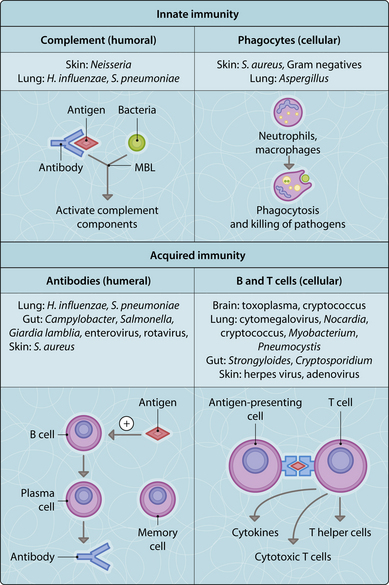30. Infections of the immunocompromised host
Pathogenesis
The immune system is a complex of innate and adaptive immune mechanisms (Chs 11 and 12). Defects can be primary (congenital, e.g. in complement or the mannose-binding lectin (MBL)),or, more commonly, secondary (acquired) arising from conditions such as HIV/AIDS, chemotherapy, diabetes mellitus and alcoholism. As a result, the patient becomes immunocompromised or immunodeficient and susceptible to certain infections. The type and degree of the defect affects the type and severity of infection (Fig. 3.30.1). Common defects affect the humoral or cellular responses, the complement system and phagocyte function. Complement and specific antibodies are important to opsonize pathogens in order to improve phagocytosis, killing and antigen presentation by cells such as macrophages and neutrophils. The host protein MBL binds directly to carbohydrate surface structures of bacteria, fungi or parasites and initiates complement fixation and subsequent killing by activating serine proteases. T cells are important for the recognition and destruction of virus-infected cells, intracellular pathogens (Mycobacterium tuberculosis, Listeria sp.) and to activate specific adaptive responses. The immunocompromised host becomes particularly susceptible to pathogens that would not normally cause infections in healthy persons (opportunistic pathogens, e.g. Pneumocystis jirovecii). Organisms may also disseminate, causing overwhelming infection.
Risk groups
< div class='tao-gold-member'>
Stay updated, free articles. Join our Telegram channel

Full access? Get Clinical Tree










